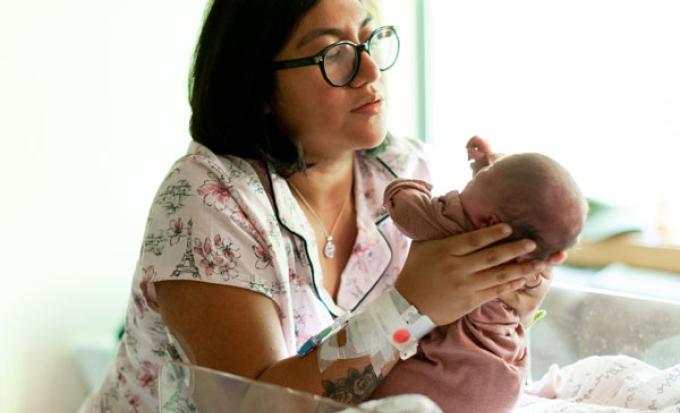Third Trimester
Week 27 to the end of the pregnancyIt’s time to start preparing for life with your new baby.
Congratulations! You're in your final trimester, meaning you've been pregnant for 27 or more weeks. It’s almost time to welcome your baby to the world.
The third trimester comes with its own set of physical challenges as your body continues to change and grow. However, you’re most likely more focused on preparing for life after your baby arrives. From labor and birthing options to preparing to breastfeed, now is the time to make these decisions.
Not only is your belly getting larger, you may feel much more tired now.
Talk to your doctor about Braxton-Hicks contractions (false labor) and how to tell when you are really in labor. You can expect to see your doctor more often now, too.
Your Body Right Now
- 29 weeks (approximately): prenatal visits change from monthly to every two weeks.
- 36 weeks (approximately): prenatal visits are scheduled once every week. A pelvic examination will be performed to determine the dilation and effacement of the cervix.
Your Baby Right Now
Your baby is almost ready to meet you! At 35 weeks, your baby is about 16 inches long and weighs about five pounds. The survival rate of babies born at 35 weeks is 99 percent.
Near the end of your pregnancy, you may notice a decrease in fetal movement. This is because there is less room in the uterus for your baby to move around. While this is not necessarily cause for alarm, you should alert your doctor if you notice an abrupt decrease in activity.
Pre-Registration
If you haven’t already, complete the pre-registration form (OB Express) online, you should do it now. About 45 days before your due date, you will need to come to Woman’s to complete your OB Express registration and sign consent forms. Registering before your hospital stay will speed up your admission when you are in labor.
You can complete your OB Express registration at two different locations: our Outpatient Lab in the Physician Office Building, or Admitting on the first floor of the hospital.
-

Go into labor with confidence.
Your baby will be the center of your world. We make you the center of ours. Learn about comfort measures, birth options, and types of deliveries. We are with you to meet your individual needs.
YOU MAY BE WONDERING
Just as no two women are the same, no two childbirth experiences will be either. During the third trimester, it is a good idea to continue taking childbirth classes in preparation for the big day, especially in the case of first pregnancies.
Our online childbirth class, Understanding Birth e-Class, is ideal for those expectant parents who can't attend an on-site childbirth class.
About two weeks before your due date, you should pack your suitcase for the hospital. It is a good idea to pack one bag for labor and a separate bag for recovery.
Feeling nervous? Don’t worry, it's normal to fear delivery as your due date draws near. Knowing what to expect helps ease anxiety. It is also important for you to be prepared and take an active part in your recovery. Don’t forget to rest and pamper yourself to get ready for the big day.
After months of waiting, it’s just about time to hold your baby in your arms. Prepare in advance to begin breastfeeding your baby during your hospital stay. Woman’s has prenatal breastfeeding classes and lactation consultants to help you with education and assistance.
During one of your prenatal visits close to 28 weeks, your physician will conduct a glucose tolerance test to check for gestational diabetes. Gestational diabetes is similar to type 2 diabetes. It occurs when your body cannot use blood sugar correctly during pregnancy. If you had gestational diabetes with one pregnancy, you are likely to have it again.
Now that you’re in the third trimester, it's time to choose a doctor for your baby. Personal preference plays an important role in finding the right pediatrician for you and your new baby.
One of the first things you should consider is if you would like a single physician practice where you see the same pediatrician each time you visit, or a large practice where you might see several different pediatricians.
Remember the physical location of the practice and its convenience is important.
Don’t forget to talk to friends and family, and ask their advice.
Here are a few direct questions you may want to ask once you’ve narrowed down your choices:
- How are after-hour illnesses handled, including Saturday and Sundays?
- Can I get a same-day appointment for a sick child?
- What is the doctor's philosophy regarding antibiotics?
- How long will I wait to be seen on an average day?
- Does the doctor accept my insurance plan?
- What hospital(s) does the doctor admit to and visit?
- What is the doctor's philosophy on recommended immunizations?
- What is the doctor's opinion of alternative care or homeopathic treatment?
- As a parent, how am I involved in deciding my child's care?
- How does the doctor feel about breastfeeding for newborns?
After waiting for months to meet your new baby, you'll want to spend every second getting to know him. Take our After Baby Comes (ABC): Baby Care and Parent Care class and plan ahead now to make the transition home easier.
Things to do before your baby arrives:
- Install the car seat
- Make a baby registry if you plan to have baby showers
- Prepare the nursery or place where baby will sleep
- Think about names
- Secure childcare
We've created a checklist to help you decide what to bring to the hospital.
If you are having regular contractions that become stronger and closer together, you are probably in labor. If your water breaks, call your doctor even if you are not having contractions.
There are several places to have your car seat checked to be sure it is installed correctly in the rear seat of the vehicle.
Talk to your older children about the new baby throughout your pregnancy, especially as your due date grows near. Set realistic expectations for how much the baby will sleep, and how much care the baby will require.
The short answer is: yes. Many women experience heartburn throughout pregnancy, usually toward the end of pregnancy when your baby is pressing against your digestive organs. Try to avoid spicy, fatty foods and eat small, frequent meals rather than a few large meals. Talk to your doctor about prescription heartburn medication, if needed.




